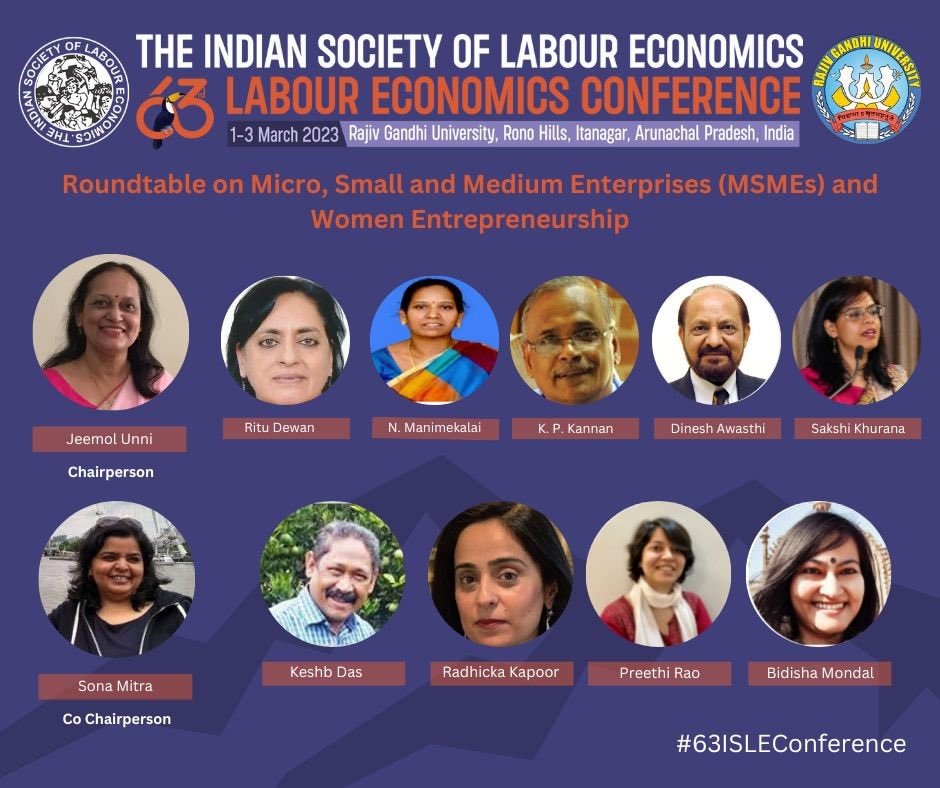Roundtable discussion held by IWWAGE at the 63rd Indian Society of Labour Economics (ISLE) Conference

IWWAGE was part of the 63rd Indian Society of Labour Economics (ISLE) conference held at Rajiv Gandhi University, Itanagar, Arunachal Pradesh. They were part of a roundtable panel discussion on ‘Micro, Small, and Medium Enterprises (MSMEs) and women entrepreneurship’, that took place on 2nd March 2023. The Chairperson of the roundtable was Jeemol Unni (Professor of Economics at Amrut Mody School of Management, Ahmedabad University). The session was co-chaired and moderated by Sona Mitra (Principal Economist, IWWAGE-LEAD at Krea University). The panellists were N.Manimekalai (Director and Head, Department of Women’s Studies Bharathidasan University), K.P Kannan (Chairman, Laurie Baker Centre for Habitat Studies), Dinesh Awasthi (Vice Chancellor at Lok Jagruti University, Ahmedabad), Sakshi Khurana (Senior Specialist, Labour, Employment and Skill Development, NITI Aayog), Keshab Das (Professor at Gujarat Institute of Development Research, Ahmedabad), Radhicka Kapoor (Senior Fellow at Indian Council for Research on International Economic Relations, New Delhi), Preethi Rao (Associate Director, LEAD at Krea University), Jarjum Ete (Former Chairperson, Arunachal Pradesh State Commission for Women), and Bidisha Mondal (Research Fellow, IWWAGE-LEAD at Krea University).
The roundtable focussed on a few pertinent questions on barriers to women entrepreneurship and proposed effective policy measures to address those concerns. It was emphasized in the discussion that the distinction of women entrepreneurs with respect to their size of capital, number of employees, push and pull factors, is of pivotal importance to formulate an effective entrepreneurship policy as the barriers/challenges differ among them depending on these factors. Women working as own-account workers, often resort to self-employment as an alternative to unemployment to derive their subsistence earnings, and they are inappropriately called to be entrepreneurs as they lack any entrepreneurial aspirations. These subsistence entrepreneurs mostly consisting of home-based workers, street vendors working with extremely low capital and almost without any hired employees, are the working poor earning much less than the casual workers and trying to make it up only by self-exploitation. This kind of self-employment often has a seasonal component leading to a rise in these activities in festive seasons. The challenges of these necessity-driven subsistence-entrepreneurs is much different from that of the small or medium enterprises.
According to the discussion, the challenges to these subsistence entrepreneurs include i) individual-specific barriers like lack of aptitude, technical and business skills due to lack of training; poor self-confidence and decision-making abilities; lack of access to business network; low financial resources; poor access to market information; and ii) restrictive social norms like disproportionately high share of household responsibilities; mobility constraints; lack of family support; lack of favourable property rights leading to lack of collateral and low access to financial resources. These challenges become more severe for women coming from marginalized socio-economic background. The focus of the current policy initiatives has been majorly centring around the small-scale enterprises rather than these subsistence enterprises. However, to provide women an exit from the low-productivity agricultural engagement, enhance their earning capacity, and improve women’s agency in low-income households, a comprehensive policy framework with a particular focus on the barriers of these subsistence entrepreneurs working at micro level, would be much needed. One of the recommendations of the National Commission for Unorganised Enterprises has been to establish a separate financing facility for microenterprises like there exist NABARD for financing agriculture activities. Whereas the small and medium enterprises mostly have strong family support for their businesses, the challenges they face are often related to barriers in organizational development, diversification, exploring new markets, and use of new technologies. In addition to these, the gender stereotypes leading to women not being taken seriously in business transactions, are creating obstacles for all types of women-led enterprises. Despite several central and state government initiatives, there is still a lack of level-playing field for women entrepreneurs due to the prevalence of many women-specific barriers.
The prevalence of gender-based industrial segregation among women entrepreneurs and how digital technology can play a role there to increase women’s participation in male-dominated sectors, were talked about too. Women entrepreneurs are mostly engaged in less productive and less profitable informal service sector (education, health, tailoring and beautician’s services etc), and their presence in the non-traditional sectors is yet very less. But once they overcome the initial constraint and hesitation to enter the male-dominated sectors, their performances are often found to surpass their men counterparts’ performances in these sectors. A sector with huge potential for women entrepreneurs is the green economy involving waste management, water management, eco products, organic farming etc. To increase the participation of women entrepreneurs in the non-traditional sectors, few effective measures would be providing holistic support through Self-help groups, imparting appropriate skills, expansion of digital technology and digital knowledge. The digital technology can enable women entrepreneurs to be a part of professional network, to foster both forward and backward linkages with large markets, facilitate their access to financial resources and skill training, and enhance their productivity in general. The access to digital devices and knowledge is also indispensable for the women to undertake entrepreneurial activities in the emerging gig platforms. Although the gig economy is also not free from gender stereotypes and majorly still an urban phenomenon due to low penetration of digital technology in rural areas, it holds immense opportunities for women entrepreneurs. To harness the full potential, few measures such as a tie-up between fintech firms and gig platforms to facilitate financing of women entrepreneurs, promoting co-operative models in gig platforms to enhance bargaining power of women entrepreneurs, could be effective.
While unfolding the several enablers and barriers in the ecosystem, it was reemphasized that the ability to predict the untapped market is a key factor behind success for women entrepreneurship. As the trajectory of business often depends on identification of potential market demand, being a part of professional networks, and social capital are of crucial importance by providing access and guidance related to market. However, women are often excluded from entering the professional nexus and also profitable sectors of entrepreneurial activities. A well-formulated policy encompassing providing access to digital market, e-commerce platforms, smooth last-mile connectivity in case of physical markets, information about market prices and market demand, consumers’ preferences, and quality control training, would be needed. In addition to access to domestic market, integration of the women entrepreneurs with the export market would be helpful as the socio-cultural barriers are assumed to be less severe in the export market. Among the barriers, lack of financial literacy and access to financial resources drew much attention in the discussion. Along with much lower access to formal credit, women entrepreneurs are observed to receive lower loan amount too, when compared to their male counterparts. This happens in spite of the women-led enterprises showing more resilience in terms of business activities, women entrepreneurs having a better credit history and repayment rate. The proposed policy interventions include simplification of the loan application process, innovative credit scoring models as often the cash flows of women enterprises differ from others, and alternative credit mechanisms etc.
The session was concluded with emphasizing on how unavailability of large-scale data on women enterprises is creating a constraint in evidence generation to support policy formulation; and the significance of integrating women entrepreneurs with the professional network.
The actionable points suggested in the panel discussion to boost women entrepreneurship consist of promoting women entrepreneurs in non-traditional sectors, closing gender gap in digital knowledge and access to digital devices, enhancing financial literacy and inclusion among women entrepreneurs, and addressing the social norms and legal framework hindering women entrepreneurs. A policy-oriented and customized approach to the varied challenges of women-entrepreneurs is much needed at this hour.
This note has been prepared by Bidisha Mondal, Research Fellow, IWWAGE-LEAD at Krea University.





















































